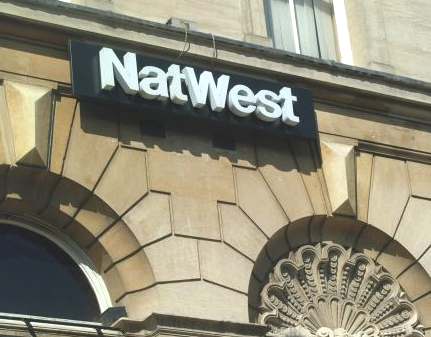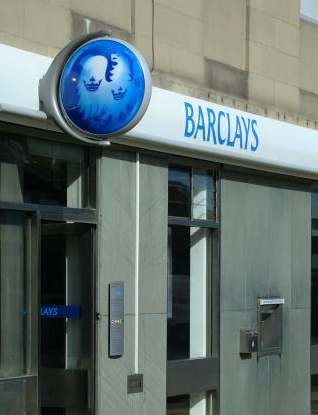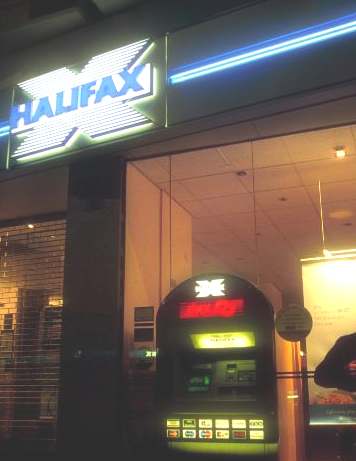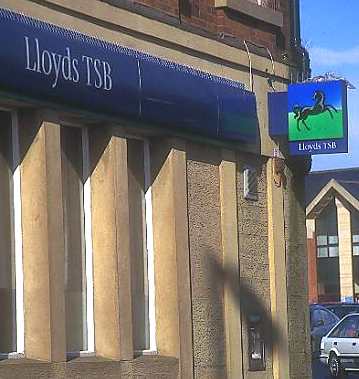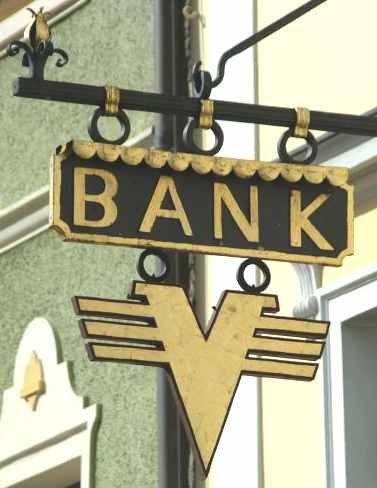|
BANKS
|
||||
|
A bank is an institution that provides financial service, particularly taking deposits and extending credit.
Currently the term bank is generally understood as an institution that holds a banking license. Banking licenses are granted by bank regulatory authorities and provide rights to conduct the most fundamental banking services such as accepting deposits and making loans. There are also financial institutions that provide certain banking services without meeting the legal definition of a bank, a so called non-banking financial company.
Banks have a long history, and have influenced economies and politics for centuries.
The word bank is derived from the Italian banca, which is derived from German language and means bench. The terms bankrupt and "broke" are similarly derived from banca rotta, which refers to an out-of-business bank, having its bench physically broken. Money lenders in Northern Italy originally did business in open areas, or big open rooms, with each lender working from his own bench or table.
Traditionally, a bank generates profits from transaction fees on financial services and from the interest it charges for lending. In recent history, with historically low interest rates limiting banks' ability to earn money by lending deposited funds, much of a bank's income is provided by overdraft fees and riskier investments.
Banks in the economy
Role in the money supply
A bank raises funds by attracting deposits, borrowing money in the inter-bank market, or issuing financial instruments in the money market or a capital market. The bank then lends out most of these funds to borrowers.
However, it would not be prudent for a bank to lend out all of its balance sheet. It must keep a certain proportion of its funds in reserve so that it can repay depositors who withdraw their deposits. Bank reserves are typically kept in the form of a deposit with a central bank. This behaviour is called fractional-reserve banking and it is a central issue of monetary policy. Some governments (or their central banks) restrict the proportion of a bank's balance sheet that can be lent out, and use this as a tool for controlling the money supply. Even where the reserve ratio is not controlled by the government, a minimum figure will still be set by regulatory authorities as part of bank regulation.
Size of global banking industry
Worldwide assets of the largest 1,000 banks grew 15.5% in 2005 to reach a record $60.5 trillion. This follows a 19.3% increase in the previous year. EU banks held the largest share, 50% at the end of 2005, up from 38% a decade earlier. The growth in Europes share was mostly at the expense of Japanese banks whose share more than halved during this period from 33% to 13%. The share of US banks also rose, from 10% to 14%. Most of the remainder was from other Asian and European countries.
The US had by far the most banks (7,540 at end-2005) and branches (75,000) in the world. The large number of banks in the US is an indicator of its geographical dispersity and regulatory structure resulting in a large number of small to medium sized institutions in its banking system. Japan had 129 banks and 12,000 branches. In Western Europe, Germany, France and Italy had more than 30,000 branches each. This was twice the number of branches in the UK. [1]
Bank crises
Banks are susceptible to many forms of risk which have triggered occasional systemic crises. Risks include liquidity risk (the risk that many depositors will request withdrawals beyond available funds), credit risk (the risk that those that owe money to the bank will not repay), and interest rate risk (the risk that the bank will become unprofitable if rising interest rates force it to pay relatively more on its deposits than it receives on its loans), among others.
Banking crises have developed many times throughout history when one or more risks materialize for a banking sector as a whole. Prominent examples include the U.S. Savings and Loan crisis in 1980s and early 1990s, the Japanese banking crisis during the 1990s, and the bank run that occurred during the Great Depression, and the recent liquidation by the central Bank of Nigeria, where about 25 banks were liquidated.
Regulation
The combination of the instability of banks as well as their important facilitating role in the economy led to banking being thoroughly regulated. The amount of capital a bank is required to hold is a function of the amount and quality of its assets. Major banks are subject to the Basel Capital Accord promulgated by the Bank for International Settlements. In addition, banks are usually required to purchase deposit insurance to make sure smaller investors are not wiped out in the event of a bank failure.
Another reason banks are thoroughly regulated is that ultimately, no government can allow the banking system to fail. There is almost always a lender of last resortin the event of a liquidity crisis (where short term obligations exceed short term assets) some element of government will step in to lend banks enough money to avoid bankruptcy.
Profitability
Large banks in the United States are some of the most profitable corporations, especially relative to the small market shares they have. This amount is even higher if one counts the credit divisions of companies like Ford, which are responsible for a large proportion of those company's profits. For example, the largest bank, Citigroup, which for the past 3 years has made more profit than any other company in the world, has only a 5% market share. Now if Citigroup were to be as dominant in its industry as a Home Depot, Starbucks, or Wal Mart in their respective industries, with a 30% market share, it would make more money than the top ten non-banking U.S. industries combined.
In the past 10 years in the United States, banks have taken many measures to ensure that they remain profitable while responding to ever-changing market conditions. First, this includes the Gramm-Leach-Bliley Act, which allows banks again to merge with investment and insurance houses. Merging banking, investment, and insurance functions allows traditional banks to respond to increasing consumer demands for "one stop shopping" by enabling cross-selling of products (which, the banks hope, will also increase profitability). Second, they have moved toward risk-based pricing on loans, which means charging higher interest rates for those people who they deem more risky to default on loans. This dramatically helps to offset the losses from bad loans, lowers the price of loans to those who have better credit histories, and extends credit products to high risk customers who would have been denied credit under the previous system. Third, they have sought to increase the methods of payment processing available to the general public and business clients. These products include debit cards, pre-paid cards, smart-cards, and credit cards.
These products make it easier for consumers to conveniently make transactions and smooth their consumption over time (in some countries with under-developed financial systems, it is still common to deal strictly in cash, including carrying suitcases filled with cash to purchase a home). However, with convenience there is also increased risk that consumers will mis-manage their financial resources and accumulate excessive debt. Banks make money from card products through interest payments and fees charged to consumers and companies that accept the cards.
The banks' main obstacles to increasing profits are existing regulatory burdens, new government regulation, and increasing competition from non-traditional financial institutions.
THE TOP TEN BANKS
Top ten banking groups in the world ranked by tier 1 capital in 2004 (in U.S. dollars)
Top ten banking groups in the world ranked by assets in 2004 (in U.S. dollars)
Top ten bank holding companies in the world ranked by profit in 2003 (in U.S. dollars)
Top ten bank holding companies in the U.S. ranked by deposits (in U.S. dollars)
As of June 30, 2004. These are U.S. deposits only. This is not a ranking of the largest U.S.-based global banks.
LINKS & REFERENCE
List of the world's ten largest banks at the end of 2004 List of the world's ten largest banks by assets in 2004 https://en.wikipedia.org/wiki/Financial_Ombudsman_Service http://www.financial-ombudsman.org/ https://en.wikipedia.org/wiki/Financial_Ombudsman_Service BBC News business Barclays LIBOR rate fixing scandal fines New York Times 2013 May 5 magazine Robert Diamonds next life http://www.nytimes.com/2013/05/05/magazine/robert-diamonds-next-life.html http://www.bbc.co.uk/news/business-18671255
MONEY FINDER
Kulo Luna $billion dollar whale When a pirate whaler kills a small humpback whale, her giant friend sinks the pirate ship to avenge the death, but is itself wounded. The pirates put a price on the whale's head, but an adventurer in an advanced solar powered boat races to beat the pirates and save the wounded animal.
A heartwarming action adventure: Pirate whalers V Conservationists, with an environmental message and a $Billion dollars riding on the winner. For release as an e-book in 201 6 with hopes for a film in 2018.
|
||||
|
This website is copyright ฉ 2015 Electrick Publications. All rights reserved. The bird logo and names Solar Navigator, Utopia Tristar and Blueplanet Ecostar are trademarks . The Blueplanet vehicle configuration is registered ฎ. All other trademarks hereby acknowledged and please note that this project should not be confused with the Australian: 'World Solar Challenge'which is a superb road vehicle endurance race from Darwin to Adelaide. Max Energy Limited is an educational charity working hard to promote world peace.
|
||||
